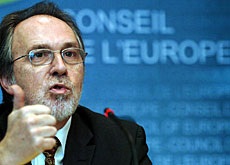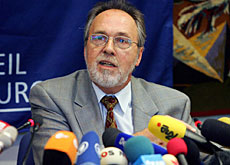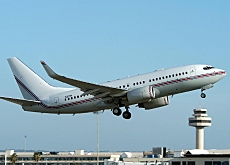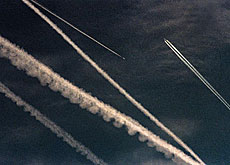“Europe must defend its values”

Swiss senator Dick Marty talks to swissinfo about his report into allegations that the CIA set up secret prisons in eastern Europe to interrogate terror suspects.
Marty was appointed in November 2005 by the Council of Europe to look into the affair and on June 7 concluded that 14 European nations colluded with United States intelligence in a “spider’s web” of human rights abuses.
The claims triggered a wave of angry denials and dismissals – with the US State Department calling it “a rehash” – but also accusations that governments are stonewalling attempts to confront Europe’s role in the controversy.
Marty, a former prosecutor, says he is convinced various governments are attempting to discredit his report, which will be debated by the Council of Europe in a plenary session on Tuesday.
swissinfo: Your report has attracted a lot of praise but also a lot of criticism from the countries which are implicated. Did you expect to make so many enemies when you took on this job?
Dick Marty: I took on this job with a great sense of conviction. For me it’s all about defending values which have enabled Europe to take a considerable step forwards over the past 60 years.
After the catastrophe of the Second World War, Europe made unbelievable progress when it ratified the convention on human rights and established the European Court of Human Rights. These institutions are barriers which make falling back into savagery impossible.
It is there quite normal that the Council of Europe, as guarantor of these values, is concerned with the secret flights. It has been demanding uncompromising action to be taken against terrorism for a long time, but this must be conducted constitutionally and not illegally.
swissinfo: According to your report, these illegal practices were a matter of course for the United States administration.
D.M.: In fact the US coined the term “rendition”. In practice this means people who are suspected of terrorism can be taken prisoner without this suspicion having any legal basis.
Only some of these detention centres are known, such as Guantanamo or Kabul. In most cases prisoners are taken to other centres or delivered to their country of origin, where they are often tortured. Anyone who believes in the rule of law should find it unacceptable that these people have never been granted constitutional rights or a trial.
The US administration has at any rate taken a clear decision, namely they are at war against terror. As a result the civil penal code does not apply [to them] and neither do the laws of combat, starting with the Geneva Conventions.
swissinfo: Yet the US, like Europe, sees itself as the great defender of liberty and human rights.
D.M.: I still consider the US a free and democratic country. But in an international context their attitude is somewhat ambiguous. When it comes to the law, it’s one rule for them and another for others. So their measures against terrorism are not applied to their own citizens but only to non-Americans – and outside American territory at that.
That is an absolutely unacceptable form of legal apartheid. The Americans have developed an incredibly simple philosophy: anything goes if Americans benefit from it.
swissinfo: The US continues to maintain that terrorism cannot be defeated by conventional methods. Does that stand up?
D.M.: Personally I think the methods used by the US in recent years have been not only inefficient but also counterproductive. They are turning the Muslim world against them and thereby creating sympathisers for terrorism. These sympathisers are like oxygen for a fire – the more there are, the more terrorists feel their actions are legitimised.
European states have also been the target of terrorism but have always dealt with the problem using constitutional methods.
swissinfo: But in your report you criticise European states.
D.M.: European states have for some time delegated the fight against terror to the US, so when the secret service of a superpower is at work, they look away – even if their own values are violated. This I find very alarming.
I am accusing the West of never having openly discussed anti-terror strategies. At an international level there isn’t a single legal definition of terrorism. It is vital to develop a common strategy including not only repression but also prevention and political intervention.
swissinfo: You accuse Switzerland of “subservience” towards the US. What concrete accusations are you making?
D.M.: I was personally shocked at how thoughtlessly Switzerland renewed the annual licence for US planes to fly through Swiss airspace despite already existing indications of possible abuses by the CIA. All it took to satisfy the Swiss authorities was a verbal promise by an official in Washington that Swiss airspace was not being violated.
swissinfo: Do you think the Council of Europe will approve your report?
D.M.: Until recently I was very optimistic. But I now know for certain that some countries are going to great lengths to cast doubt on its accuracy and honesty. If the European parliamentarians think defending their country is more important than defending the values of the Council of Europe, then things won’t go very well.
swissinfo-interview: Armando Mombelli
In November 2005 Human Rights Watch alleged the existence of secret detention camps in Europe and the kidnapping of suspected terrorists by the CIA.
The human rights watchdog, the Council of Europe, asked Dick Marty, a Swiss senator and chairman of the council’s Committee on Legal Affairs and Human Rights, to launch an investigation.
Marty presented a report on June 7 and drafted a resolution to be debated by the Council of Europe in a plenary session on Tuesday, June 27.
Marty’s report accuses 14 European countries of having colluded with the CIA on secret prisons and transfers of terrorism suspects.
The report accuses the Swiss government of turning a blind eye to allegations of suspect aircraft transiting the country’s airspace. Switzerland has also extended permission to the end of this year for overflights by non-commercial US aircraft.
Dick Marty was born in Lugano, southern Switzerland, in 1945.
He studied law in Neuchâtel (western Switzerland) and Freiburg (Germany).
Between 1975-89 he worked as public prosecutor in canton Ticino.
He served as member of the cantonal Ticino government from 1989 to 1995.
He has represented his canton as a senator in the Swiss parliament since 1995.
In 1999 he was elected to the Council of Europe and took over the chair of the Committee on Legal Affairs and Human Rights last year.

In compliance with the JTI standards
More: SWI swissinfo.ch certified by the Journalism Trust Initiative




You can find an overview of ongoing debates with our journalists here. Please join us!
If you want to start a conversation about a topic raised in this article or want to report factual errors, email us at english@swissinfo.ch.